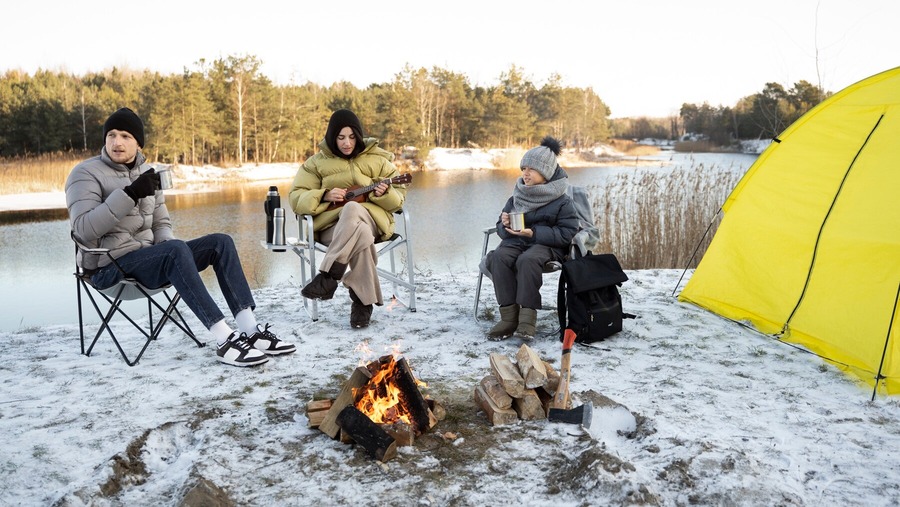Winter camping can be an exhilarating and unforgettable experience for outdoor enthusiasts.
The crisp, icy air, the pristine white landscapes, and the absence of crowds make it a truly unique adventure.
However, with the beauty of winter camping comes a set of challenges that require careful planning and preparation.
From staying warm and dry to navigating through snowy trails, there are several tips and tricks that can make your winter camping trip not only enjoyable but also safe.
In this blog post, we will share some expert advice and insights on how to make the most of your winter camping experience:
Related: Hiking Tips For Beginners
Winter Camping Tips and Tricks
Listed below are the best tips for camping in winter:
1. Layer Clothing
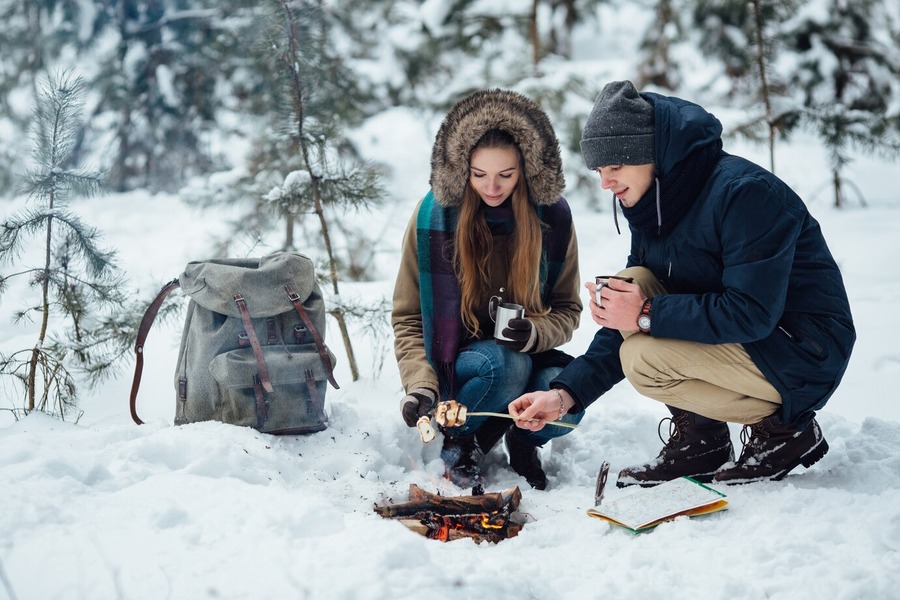
Dressing appropriately is crucial for winter camping, where temperatures can fluctuate dramatically.
Start with a moisture-wicking base layer to keep sweat away from your skin, preventing the chill of damp clothing. Add an insulating layer, such as fleece or down, to trap and retain body heat. Finally, use a waterproof and windproof outer layer to shield yourself from the elements.
This three-layer system allows you to adjust your clothing to varying conditions, ensuring you stay warm and dry throughout your adventure.
2. Quality Sleeping Bag
A high-quality sleeping bag is your primary defense against the cold when camping in winter.
Look for a bag with a temperature rating suitable for the coldest expected nights. Down-filled bags are excellent for their warmth-to-weight ratio, but synthetic alternatives can be more resilient in damp conditions.
Ensure your sleeping bag is properly insulated and consider using a liner for an extra layer of warmth.
3. Insulated Sleeping Pad
The ground can act as a significant source of heat loss, making an insulated sleeping pad indispensable. Choose a pad with a high R-value to provide effective insulation from the cold ground.
Inflatable pads with synthetic insulation or closed-cell foam pads are popular choices for winter camping, providing an additional barrier against the cold.
4. Proper Tent
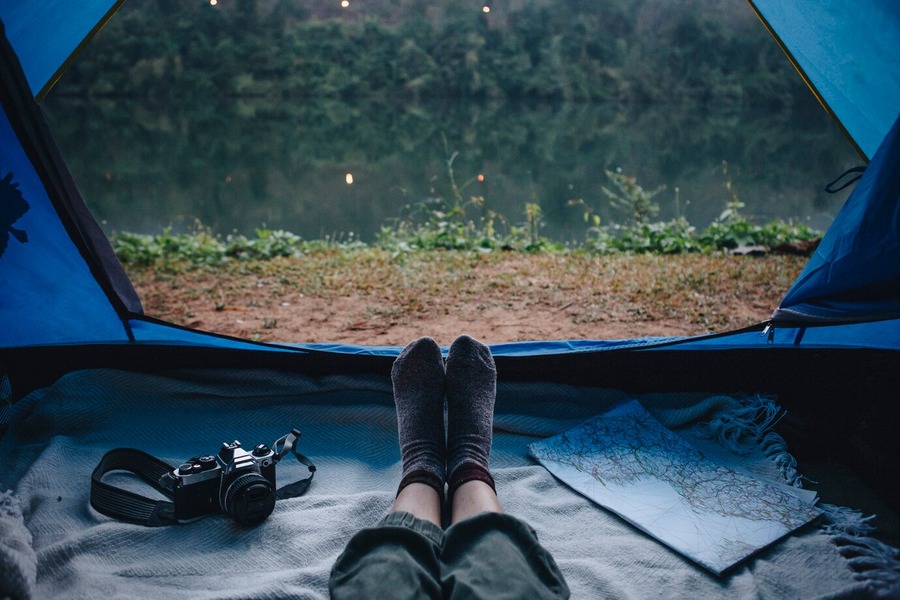
A four-season tent is designed to handle the challenges of winter camping.
Look for a tent with a sturdy frame, reinforced poles, and durable materials capable of withstanding snow accumulation and strong winds.
Ventilation is also crucial to prevent condensation inside the tent, which can lead to dampness and reduced insulation effectiveness.
5. Hot Drinks and High-Calorie Foods
Winter camping requires additional energy to stay warm, so bring a portable stove to prepare hot drinks and high-calorie meals.
Warm beverages like tea, coffee, or hot chocolate not only lift morale but also contribute to maintaining body temperature. Pack calorie-dense foods that are easy to prepare, providing the fuel your body needs to deal with the cold.
6. Dry Firewood
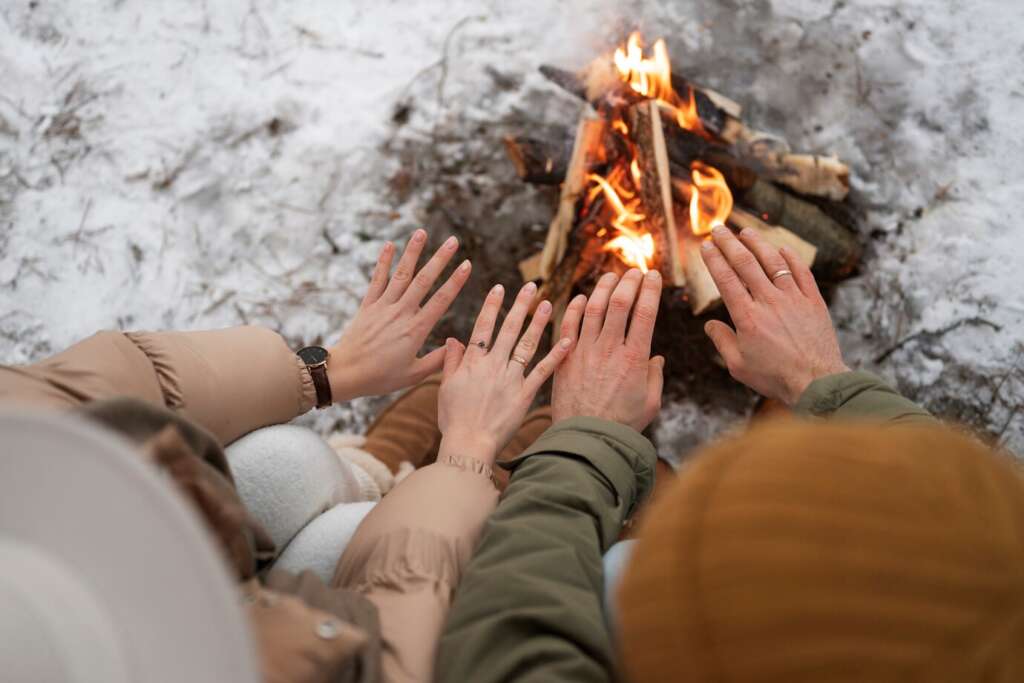
Building a fire is not just a recreational activity; it’s one of the best winter camping tips to stay warm in the wind.
Ensure you have access to dry firewood, as wet wood can be challenging to ignite and maintain.
Carry a small axe or saw to process fallen branches and wood, and always follow Leave No Trace principles when collecting firewood.
7. Wind Protection
Set up your camp in a sheltered area to minimize exposure to wind.
While a breeze can be refreshing, strong winds can significantly increase the chill factor. Utilize natural windbreaks like trees or terrain, and position your tent to face away from prevailing winds.
This provides not only physical protection but also contributes to a more comfortable camping experience.
8. Stay Hydrated
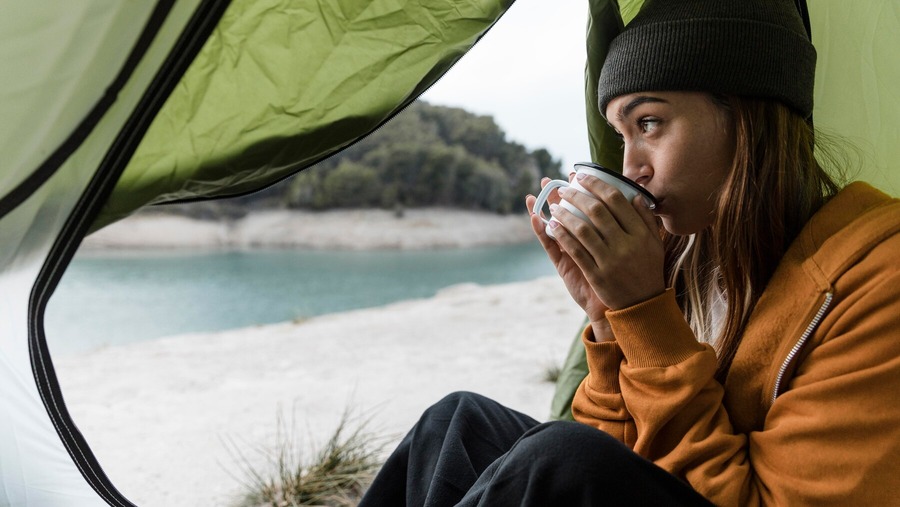
It’s easy to overlook hydration in cold weather, but staying well-hydrated is an essential winter camping tip for maintaining body heat.
Cold air can be deceptively drying, and activities like hiking or snowshoeing can lead to increased water loss. Pack a reliable water bottle, and consider using an insulated sleeve to prevent your water from freezing.
Additionally, warm beverages like herbal teas can contribute to your overall fluid intake.
9. Emergency Kit
Winter conditions can be unpredictable, so a comprehensive emergency kit is a must.
Include essentials such as a first aid kit, a multi-tool, a reliable light source with extra batteries, a map and compass (or GPS), and a signal device.
Familiarize yourself with basic winter survival skills, such as building a snow shelter, and ensure your emergency kit is easily accessible in case of unforeseen circumstances.
Final Remarks
As we come to the end of this blog post, we hope you have found these tips for winter camping helpful and informative.
Remember, preparation is key when it comes to facing the challenges of winter camping.
Whether you are a seasoned camper or a beginner, be sure to plan ahead, pack accordingly and stay warm.
Don’t let fear hold you back from experiencing the serenity and peace that can only be found in the great outdoors during this season.


